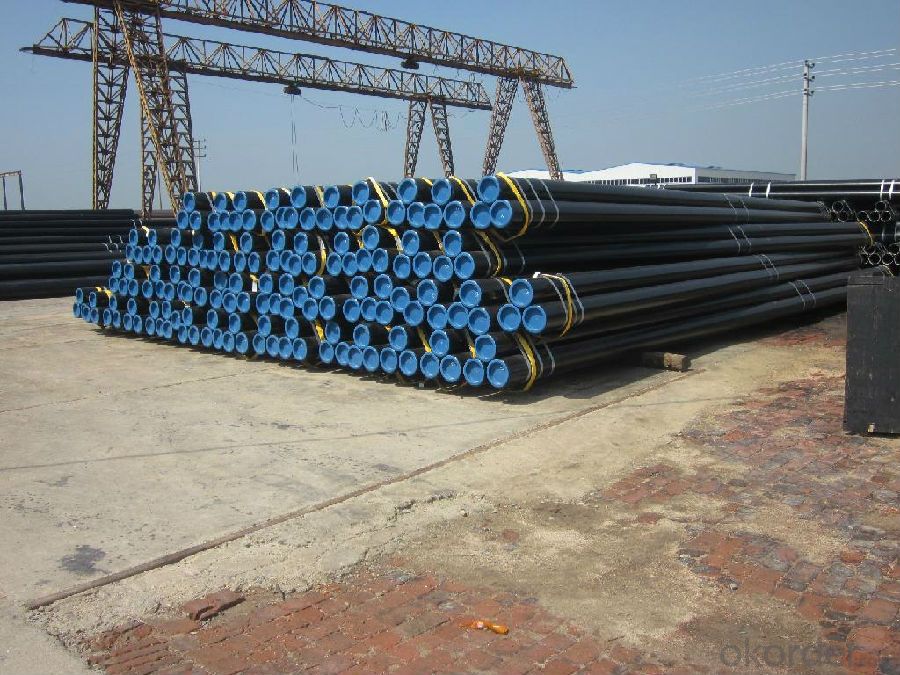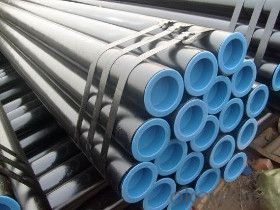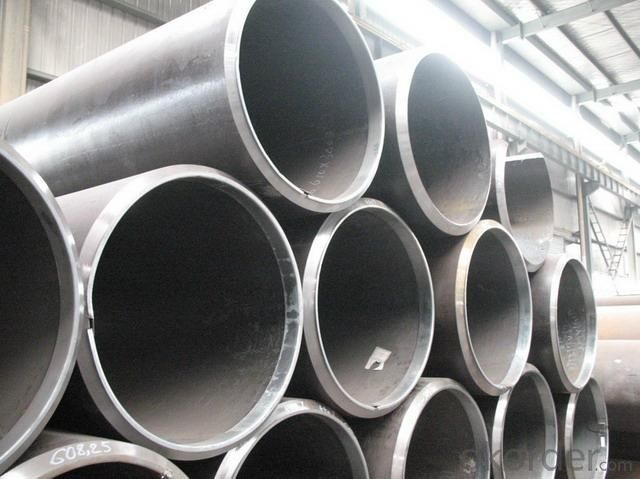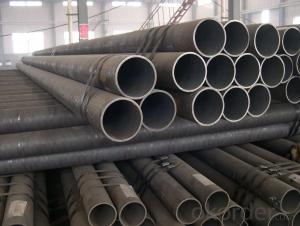Carbon Seamless Steel Tube Of High Quality
- Loading Port:
- Tianjin
- Payment Terms:
- TT OR LC
- Min Order Qty:
- 23 m.t.
- Supply Capability:
- 444 m.t./month
OKorder Service Pledge
OKorder Financial Service
You Might Also Like
Product Description:
1、Structure of Steel Pipe Descrption:
Having vast industrial knowledge of domain, we are offering a quality approved array of Stainless Steel Round Pipe. The Stainless Steel Round Pipe we offer is widely demanded amongst the clients for its sturdiness and reliability. These products are tested for their quality before being introduced in the market.
2、Main Features of the Steel Pipe:
·Highly demanded
·Durable
·Reliable
·resist corrosion
3、Steel Pipe Images:



4、The Steel Pipe Specification:
Standard JIS, DIN, ASTM
JIS G3445-2006, JIS G3444-2006, JIS G3446-2004, DIN EN 10216-1-2004, DIN EN 10217-1-2005, DIN EN 10305, ASTM A106-2006, ASTM A53-2007, ASTM A789-2001, ASTM A1020-2002, ASTM A179-1990, ASTM A199Grade Cr-Mo alloy, Mo, ST35-ST52, Q195-Q345, CrNi alloy
15CrMo, 10CrMo910, 30CrMo, 15Mo3, 16Mo, St37, St52, St42, St45, Q235, Q345, Q195, Q215, Cr17Ni8, 1Cr13Mn9Ni1NThickness 2 - 50 mm Section Shape Round Outer Diameter 10 - 900 mm Secondary Or Not Non-secondary Application Structure Pipe Technique EFW Certification API Surface Treatment Paint Special Pipe API Pipe Alloy Or Not Non-alloy
Tips:1.W.T from 2mm to 70mm 2.OD from 10 to 1200mm 3.product by our own factory 4.on time dilivery
5、FAQ of Square Tube:
①How is the quality of your products?
Our products are manufactured strictly according to national and internaional standard, and we take a test
on every pipe before delivered out. If you want see our quality certifications and all kinds of testing report, please just ask us for it.
Guaranteed: If products’ quality don’t accord to discription as we give or the promise before you place order, we promise 100% refund.
②How about price?
Yes, we are factory and be able to give you lowest price below market one, and we have a policy that “ for saving time and absolutely honest business attitude, we quote as lowest as possible for any customer, and discount can be given according to quantity”,if you like bargain and factory price is not low enough as you think, just don’t waste your time.Please trust the quotation we would give you, it is professional one.
③Why should you chose us?
Chose happens because of quality, then price, We can give you both.Additionally, we can also offer professional products inquiry, products knowledge train(for agents), smooth goods delivery, exellent customer solution proposals.Our service formula: good quality+good price+good service=customer’s trust
SGS test is available, customer inspection before shipping is welcome, third party inspection is no problem.
Any question, pls feel free to contact us !
- Q:What are the limitations of using steel pipes?
- Using steel pipes in various applications has several limitations. Firstly, the cost of steel pipes compared to materials like plastic or copper can be quite high. This can be a significant drawback for projects with limited budgets. Secondly, steel pipes are susceptible to corrosion. Exposure to moisture and certain chemicals over time can cause rust and deterioration. This can lead to leaks, reduced structural integrity, and the need for expensive repairs or replacement. Another limitation is the weight and rigidity of steel pipes. They are generally heavier and less flexible than other types of pipes, making installation and maneuvering more challenging in certain settings. Additionally, their rigid nature makes them less suitable for applications requiring movement or flexibility. Furthermore, steel pipes can experience thermal expansion and contraction. Extreme temperatures can cause them to expand or contract, potentially stressing joints, fittings, or other components. This can lead to leaks or even pipe failure if not properly addressed. Lastly, steel pipes are not as resistant to certain chemicals or substances as other materials. Some chemicals can corrode or erode the inner lining, compromising integrity and potentially causing contamination or leakage. While steel pipes have advantages, it is important to consider these limitations when selecting the most suitable material for a specific application.
- Q:How are steel pipes used in the construction of biomass power plants?
- Steel pipes are commonly used in the construction of biomass power plants for various purposes. They are used to transport and distribute water, steam, and other fluids within the plant, as well as to carry and contain biomass fuel, such as wood chips or agricultural waste. Steel pipes are also used for structural purposes, providing support for equipment and structures within the plant. Additionally, they are used for exhaust systems and ventilation, ensuring the safe release of gases and managing air circulation. Overall, steel pipes play a crucial role in the efficient and reliable operation of biomass power plants.
- Q:How are steel pipes protected against external moisture?
- Steel pipes can be safeguarded against external moisture in various ways. One commonly employed method involves applying a protective coating or paint to the pipe's surface, which acts as a barrier to prevent direct contact with moisture. Depending on the specific requirements and environment, this coating can be composed of different materials like epoxy, polyethylene, or zinc. Another means of protection is through the utilization of corrosion inhibitors. These inhibitors are added to either the internal or external surfaces of the pipes, creating a protective layer that hinders moisture-induced corrosion. Chemicals like rust converters or rust preventatives are examples of corrosion inhibitors that react with the steel, forming a protective barrier. Cathodic protection is an additional technique utilized to shield steel pipes from external moisture. This technique involves the use of sacrificial anodes or impressed current to generate an electric current that safeguards the steel. Sacrificial anodes, typically made of zinc, aluminum, or magnesium, are attached to the steel pipes and corrode over time instead of the steel, thereby preventing moisture-induced corrosion. Moreover, proper insulation and waterproofing measures play a vital role in protecting steel pipes from external moisture. To provide an extra layer of protection and prevent moisture infiltration, insulation materials like foam or tape are applied to the pipes. Waterproofing measures such as sealants or membranes can also be implemented to ensure no moisture seeps into the pipes. Regular maintenance, including inspections and repairs, is crucial for ensuring the continuous protection of steel pipes against external moisture. By promptly addressing any areas of damage or corrosion, the integrity of the protective measures can be maintained, thereby extending the lifespan of the steel pipes and avoiding costly repairs or replacements in the future.
- Q:Can steel pipes be used for underground sewer lines?
- Indeed, underground sewer lines can certainly utilize steel pipes. Given their robustness, resilience, and resistance against corrosion, steel pipes are widely employed in sewer systems. They possess the capacity to withstand the immense burden of soil and external forces, rendering them highly suitable for subterranean purposes. Moreover, steel pipes boast an extended lifespan and excel in efficiently conveying wastewater and sewage over numerous years. However, it remains crucial to guarantee the appropriate coating or lining of these steel pipes to avert corrosion and further elongate their durability.
- Q:How are steel pipes handled and transported safely?
- Steel pipes are handled and transported safely by following certain procedures. They are usually lifted and moved using cranes or forklifts that have the appropriate capacity to handle their weight. To prevent damage during transportation, pipes are secured in sturdy containers or bundles, often by using straps or chains. In some cases, protective coverings or caps are used to shield the ends from any potential damage. Additionally, proper stacking techniques are employed to ensure stability and prevent accidents during transportation.
- Q:Are steel pipes suitable for use in mining applications?
- Yes, steel pipes are suitable for use in mining applications. They are highly durable, resistant to corrosion, and can withstand high pressure and extreme temperatures often encountered in mining operations. Additionally, steel pipes have excellent structural integrity and can be easily welded, making them ideal for various mining activities such as transporting fluids, ventilation systems, and underground infrastructure.
- Q:What are the different types of steel pipe fittings for chemical processing plants?
- There are several types of steel pipe fittings commonly used in chemical processing plants, including elbows, tees, reducers, flanges, and valves. Elbows are used to change the direction of the flow, tees are used to combine or split the flow, reducers are used to connect pipes with different diameters, flanges are used for connecting pipes and valves, and valves control the flow of fluid within the system.
- Q:Can steel pipes be recycled?
- Yes, steel pipes can be recycled. Steel is a highly recyclable material and can be used to create new steel products, including pipes, through processes like melting and reshaping. This helps to conserve natural resources, reduce energy consumption, and minimize waste.
- Q:How are steel pipes used in plumbing systems?
- Steel pipes are commonly used in plumbing systems due to their durability and strength. They are typically used for water supply lines, sewage lines, and gas lines. Steel pipes are resistant to corrosion, making them a reliable choice for long-term use. They are often used in high-pressure systems and are known for their ability to withstand extreme temperatures. Additionally, steel pipes are easily accessible and cost-effective, making them a popular choice in plumbing installations.
- Q:Can steel pipes be used for water treatment plants?
- Yes, steel pipes can be used for water treatment plants. Steel pipes are widely used in water treatment plants due to their high durability, strength, and resistance to corrosion. They can effectively handle the high pressure and flow requirements of water treatment processes. Additionally, steel pipes can be easily welded and joined, making them suitable for various applications within water treatment plants, such as transporting raw water, treating chemicals, and distributing treated water.
1. Manufacturer Overview |
|
|---|---|
| Location | |
| Year Established | |
| Annual Output Value | |
| Main Markets | |
| Company Certifications | |
2. Manufacturer Certificates |
|
|---|---|
| a) Certification Name | |
| Range | |
| Reference | |
| Validity Period | |
3. Manufacturer Capability |
|
|---|---|
| a)Trade Capacity | |
| Nearest Port | |
| Export Percentage | |
| No.of Employees in Trade Department | |
| Language Spoken: | |
| b)Factory Information | |
| Factory Size: | |
| No. of Production Lines | |
| Contract Manufacturing | |
| Product Price Range | |
Send your message to us
Carbon Seamless Steel Tube Of High Quality
- Loading Port:
- Tianjin
- Payment Terms:
- TT OR LC
- Min Order Qty:
- 23 m.t.
- Supply Capability:
- 444 m.t./month
OKorder Service Pledge
OKorder Financial Service
Similar products
New products
Hot products
Hot Searches
Related keywords
































